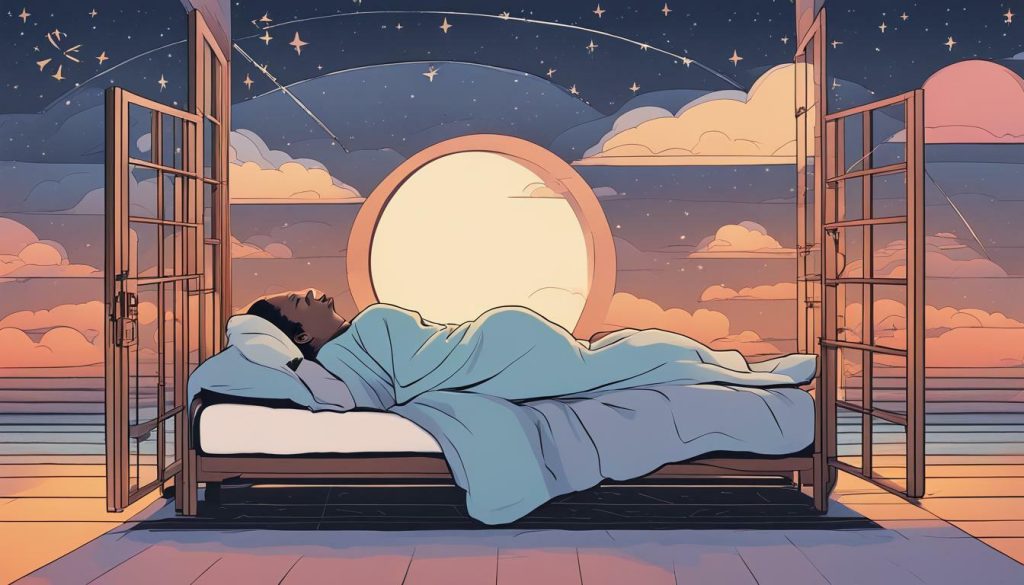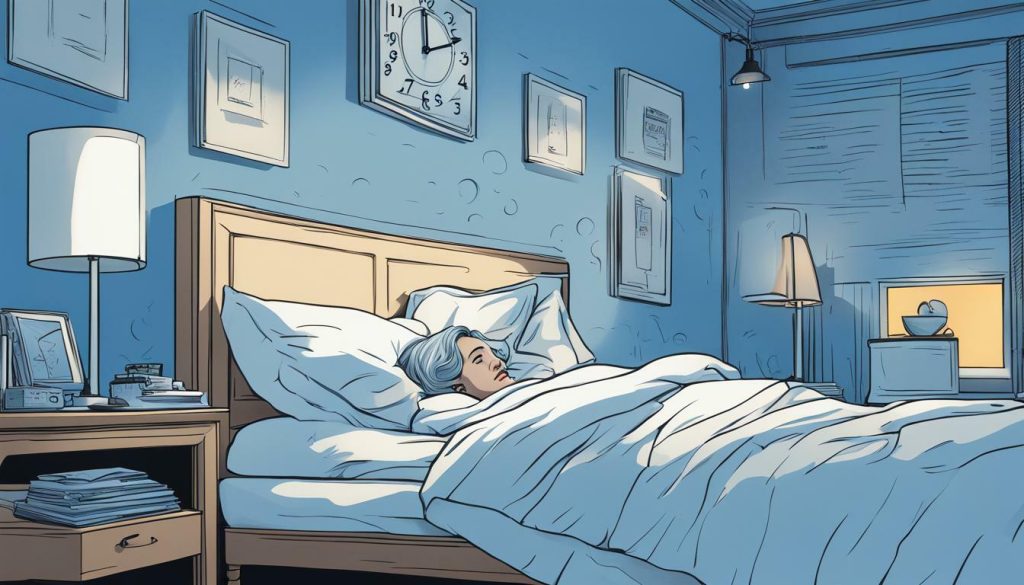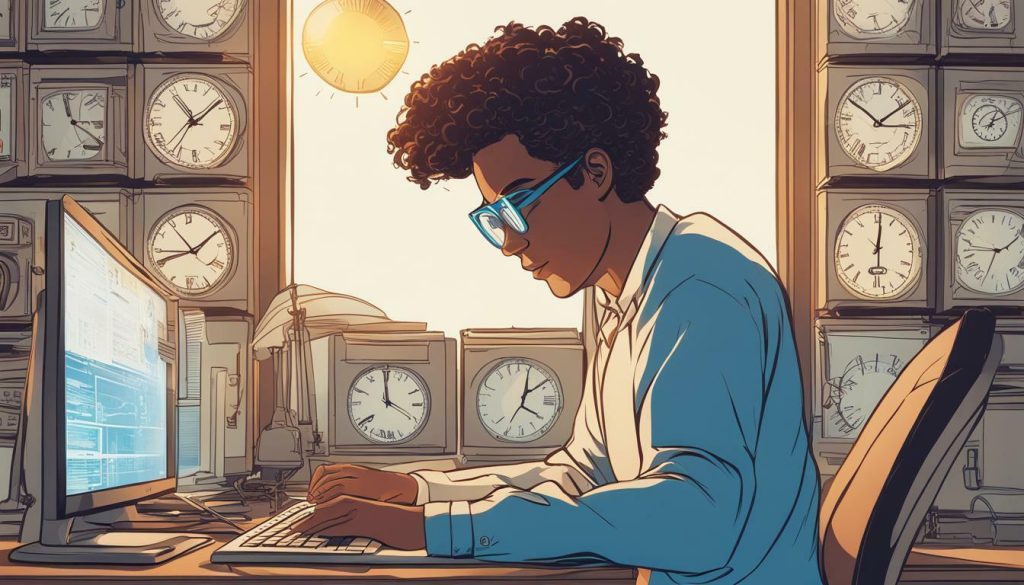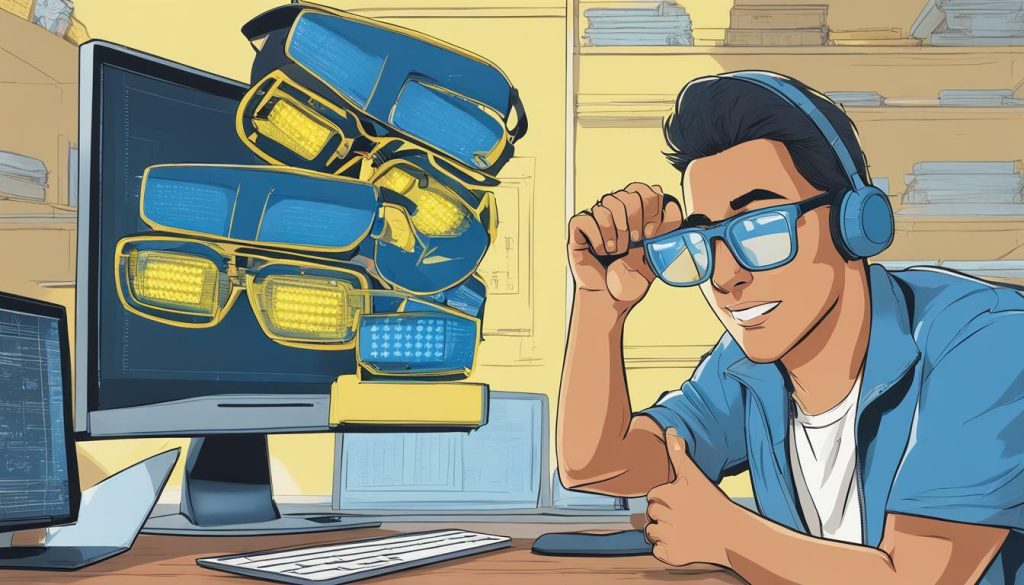Are you tired of feeling groggy and sluggish throughout the day? Your circadian rhythm may be to blame. Our internal body clock regulates many of our physiological processes, including sleep, mood, and metabolism. Disruptions to this rhythm can lead to poor sleep quality and a host of other health issues.
One of the biggest culprits of circadian rhythm disruption is exposure to blue light. This type of light, emitted by electronic devices and artificial lighting, can suppress the production of melatonin, a hormone that regulates sleep-wake cycles. Luckily, there is a simple solution: blue light glasses.
Blue light glasses work by filtering out harmful blue light, allowing your body to produce melatonin naturally and promoting a healthy circadian rhythm. Not only does this lead to better sleep quality, but it can also improve your mood, energy levels, and overall well-being.
Key Takeaways:
- Disruptions to our circadian rhythm can lead to poor sleep quality and other health issues.
- Exposure to blue light from electronic devices and artificial lighting can suppress the production of melatonin, leading to circadian rhythm disruption.
- Blue light glasses can filter out harmful blue light and promote a healthy circadian rhythm, leading to better sleep quality and improved overall well-being.
Understanding Circadian Rhythm and Sleep Cycles
Our bodies follow a natural 24-hour cycle called the circadian rhythm, which regulates our sleep-wake cycle, hormone production, and other bodily functions. At the core of this system is the suprachiasmatic nucleus (SCN) in the brain, a group of cells that respond to light and help us stay alert during the day and sleep at night.
When the SCN detects light, it signals the brain to reduce the production of melatonin, a hormone that makes us feel sleepy. As the day turns into night and our exposure to light decreases, the SCN triggers the release of melatonin, making us feel tired and ready to sleep. This natural process of transitioning from wakefulness to sleepiness is crucial for getting restorative rest and maintaining overall health.
| Stages of Sleep | Description | Duration |
|---|---|---|
| NREM Stage 1 | Light sleep, easily disturbed | 5-10% |
| NREM Stage 2 | Deeper sleep, body temperature drops | 45-50% |
| NREM Stage 3 | Deep sleep, difficult to wake up | 15-20% |
| REM Sleep | Active sleep, vivid dreams | 20-25% |
Sleep is divided into four stages, each with unique characteristics and functions. Non-rapid eye movement (NREM) sleep comprises stages 1-3, with stage 3 being the deepest and most restorative phase. Rapid eye movement (REM) sleep, on the other hand, is an active stage of sleep associated with vivid dreaming and cognitive processing.
Optimizing circadian rhythm and sleep quality involves understanding these different sleep stages and pursuing lifestyle changes and interventions that support healthy sleep patterns.
Understanding Circadian Rhythm and Sleep Cycles: Why It Matters
Disruptions to the circadian rhythm can have significant consequences for our health, including increased risk for obesity, cardiovascular disease, and mood disorders. Poor sleep quality and chronic sleep deprivation have also been linked to impaired cognitive function, decreased immunity, and other negative outcomes.
By understanding the importance of circadian rhythm and sleep cycles, we can make informed decisions about how to prioritize sleep and create an environment that supports our bodies’ natural sleep-wake cycle.

The Impact of Blue Light on Sleep
Exposure to blue light from electronic devices and artificial lighting can have a significant impact on your sleep quality. This is because blue light suppresses the production of melatonin, a hormone that helps regulate sleep-wake cycles.
Research has shown that exposure to blue light before bedtime can delay the onset of sleep, reduce the quality of sleep, and interfere with the overall duration of sleep. This can lead to feelings of fatigue, daytime sleepiness, and decreased productivity.
In addition, excessive exposure to blue light at night has been associated with a higher risk of developing chronic conditions such as obesity, diabetes, and depression.
It’s important to note that not all blue light is harmful – some types, such as those found in natural sunlight, can actually be beneficial for our health. However, the blue light emitted from electronic devices and artificial lighting can disrupt our circadian rhythm and negatively impact our sleep.

To minimize the negative effects of blue light on sleep, it’s recommended to reduce exposure to blue light in the evening hours. This can be achieved by using blue light filters on electronic devices, reducing screen time before bedtime, and using dimmer, warmer-toned lighting in your environment.
Introducing Blue Light Glasses
Blue light blocking glasses are a popular solution for reducing exposure to harmful blue light. These glasses work by filtering out a portion of the blue light emitted by digital screens and artificial lighting.
The benefits of wearing blue light glasses are plentiful. Not only can they improve sleep quality by optimizing circadian rhythms, but they can also reduce eye strain caused by prolonged screen time. Additionally, studies have shown that blue light glasses may improve visual contrast, making it easier to see clearly in low light conditions.
| Benefits of Blue Light Glasses |
|---|
| Reduce exposure to harmful blue light |
| Improve sleep quality by regulating circadian rhythm |
| Reduce eye strain caused by screen time |
| Improve visual contrast for easier low light vision |
When choosing blue light blocking glasses, there are several factors to consider. Look for high-quality lenses that effectively filter out blue light, as well as a frame style and fit that are comfortable for extended wear. Some brands may offer additional features, such as glare reduction or anti-reflective coatings, which can further enhance the benefits of blue light glasses.
Investing in a pair of blue light glasses is a simple and effective way to reduce the negative impact of blue light on your sleep and overall well-being. Consider incorporating them into your daily routine to experience the benefits for yourself.

How Blue Light Glasses Support Circadian Rhythm
Wearing blue light glasses in the evening can be an effective way to support your circadian rhythm. By reducing exposure to blue light, these glasses can help regulate your body’s internal clock and improve sleep quality.
Studies have shown that exposure to blue light in the evening can suppress the production of melatonin, a hormone that is essential for regulating sleep. Blue light glasses work by filtering out harmful blue light wavelengths, allowing your body to produce the proper amount of melatonin for optimal sleep.
Research has also suggested that blue light glasses can improve sleep quality and reduce symptoms of sleep disorders. In one study, participants who wore blue light blocking glasses experienced significant improvements in sleep quality, as well as reduced fatigue and daytime sleepiness.
Overall, blue light glasses can be a useful tool for anyone looking to optimize their circadian rhythm and improve their sleep quality. By reducing exposure to blue light in the evening, these glasses can help support your body’s natural sleep-wake cycle and promote better rest and overall well-being.

Reducing Blue Light Exposure in Everyday Life
Reducing blue light exposure in your daily routine is essential for optimizing your circadian rhythm and improving overall sleep quality. Here are some practical tips to help you minimize your exposure:
- Use blue light filters on electronic devices: Most electronic devices now come with built-in blue light filters that can be activated in the settings. These filters reduce your exposure to blue light, making it easier to wind down in the evenings.
- Avoid using electronic devices before bed: The blue light from electronic devices can trick your brain into thinking it’s daytime, making it harder to fall asleep. If possible, try to avoid using electronic devices at least two hours before bedtime.
- Adjust your lighting: Consider swapping out bright, white light bulbs for softer, warmer ones in your bedroom. This can help create a more relaxing environment that promotes sleep.
- Get outside during the day: Exposure to natural sunlight during the day can help regulate your circadian rhythm by signaling to your body when it’s time to be awake and alert. Try to spend at least 30 minutes outside each day.

By implementing these simple changes, you can reduce your exposure to blue light and support a healthy circadian rhythm, leading to better sleep quality and overall well-being.
Blue Light Glasses and Eye Strain
Do you spend hours staring at a computer screen every day? If so, you may be familiar with the eye strain that often comes with prolonged screen time. But did you know that blue light emitted by electronic devices may be the culprit?
Blue light is a high-energy light that can penetrate deep into the eye, potentially causing damage over time. It can also disrupt sleep patterns by suppressing the production of melatonin, a hormone that regulates sleep-wake cycles. This is where blue light glasses come in. By filtering out harmful blue light, these glasses can help reduce eye strain and promote healthier sleep patterns.
Studies have shown that wearing blue light glasses can significantly reduce eye strain and fatigue caused by prolonged computer use. Some users have also reported improved sleep quality and decreased difficulty falling asleep after wearing blue light glasses in the evening.

So, if you’re someone who spends a lot of time in front of a screen, consider investing in a pair of blue light glasses. Not only can they help reduce eye strain, but they may also support a healthier circadian rhythm and improve overall well-being.
Maintaining a Healthy Circadian Rhythm
Aside from wearing blue light glasses, there are several lifestyle changes you can make to support a healthy circadian rhythm. One of the best things you can do is establish a regular sleep schedule. Aim to go to bed and wake up at the same time every day, even on weekends. This helps regulate your body’s internal clock and promotes better sleep quality.
Practicing good sleep hygiene is also important. This includes creating a relaxing bedtime routine, avoiding caffeine and alcohol before bedtime, and keeping your bedroom cool, dark, and quiet.
Incorporating relaxation techniques such as meditation or yoga can also be helpful for reducing stress and promoting restful sleep.
Additionally, it’s important to minimize exposure to blue light during the day. This can be achieved by using blue light filters on electronic devices or adjusting the lighting in your environment. Spending time in natural sunlight is also beneficial for regulating circadian rhythm and supporting overall health.
By making these lifestyle changes and wearing blue light glasses in the evening, you can optimize your circadian rhythm and improve your overall health and well-being.

Choosing the Right Blue Light Glasses
Now that you understand the benefits of blue light blocking glasses, it’s time to choose the right pair for you. Consider the following factors:
| Factor | Description |
|---|---|
| Lens Quality | Look for glasses with high-quality lenses that effectively block blue light while still allowing other beneficial wavelengths of light through. |
| Frame Style | Choose a frame style that you feel comfortable wearing for extended periods of time. Consider options such as lightweight materials or adjustable nose pads for a customized fit. |
| Fit | Make sure the glasses fit securely on your face to prevent slipping or discomfort. Look for options with adjustable arms or nose pads for a better fit. |
Some brands may also offer additional features such as anti-glare or UV protection. Keep in mind that while these are valuable features, they are not essential for the purpose of blue light blocking.
Ultimately, the best blue light blocking glasses are the ones that work best for you, both in terms of comfort and effectiveness. Consider trying on a few different options and reading reviews to make an informed decision.
When you find the right pair, you’ll be well on your way to better sleep and overall well-being.

Testimonials and Success Stories
Don’t just take our word for it. Here are a few real-life testimonials from people who have experienced the benefits of blue light glasses for optimizing their circadian rhythm:
“Since I started wearing blue light glasses in the evening, I’ve noticed a significant improvement in my sleep quality. I fall asleep faster and stay asleep longer. Plus, my eyes feel less strained from staring at a computer screen for hours on end.”
– Sarah B., graphic designer
“I was skeptical about blue light glasses at first, but after a few nights of wearing them, I noticed a real difference in my ability to wind down before bed. Now I sleep more soundly and wake up feeling refreshed.”
– Mike T., software engineer
“I’ve always struggled with a disrupted sleep schedule due to my job’s late-night hours. Since I started wearing blue light glasses, my sleep has been more consistent and restful. I feel like I have more energy and focus during the day as a result.”
– Megan L., bartender
These success stories are just a few examples of how blue light glasses can make a difference in your overall well-being. Don’t hesitate to try them out for yourself!

Conclusion: Enhance Your Sleep and Well-being with Blue Light Glasses
By now, you should have a good understanding of the importance of circadian rhythm for your health and well-being, as well as the detrimental effects of blue light on sleep quality and eye health. Fortunately, blue light glasses offer a simple and effective solution to counteract these negative effects.
Wearing blue light glasses in the evening can help regulate your sleep-wake cycle by reducing exposure to blue light, which in turn increases melatonin production and promotes restful sleep. Additionally, blue light glasses can reduce eye strain caused by prolonged exposure to digital screens.
When choosing blue light glasses, make sure to consider factors such as lens quality, frame style, and fit. Look for glasses with a high-quality blue light filtering coating to ensure maximum protection.
Start Enhancing Your Sleep and Well-being Today
Don’t let blue light disrupt your circadian rhythm and affect your health. Incorporate blue light glasses into your daily routine and take advantage of the benefits they offer. Combine this with other lifestyle changes, such as establishing a regular sleep schedule and practicing good sleep hygiene, and you’ll be on your way to a healthier, more well-rested you.
Don’t just take our word for it, though. Hear from others who have experienced the positive impact of blue light glasses on their sleep quality and overall well-being. Try it out for yourself and see the difference it can make!
FAQ
Q: What are blue light glasses?
A: Blue light glasses are specially designed eyewear that filters out harmful blue light emitted from electronic devices and artificial lighting.
Q: How do blue light glasses work?
A: Blue light glasses work by using special lenses that block or filter out blue light, reducing its impact on our eyes and sleep patterns.
Q: What are the benefits of wearing blue light glasses?
A: Wearing blue light glasses can help improve sleep quality, reduce eye strain, and support a healthy circadian rhythm.
Q: Can blue light glasses be worn during the day?
A: Yes, blue light glasses can be worn during the day to minimize exposure to blue light from electronic devices and artificial lighting.
Q: Are blue light glasses suitable for everyone?
A: Yes, blue light glasses can be worn by anyone who wants to protect their eyes and optimize their circadian rhythm, especially those who spend a lot of time in front of screens.

